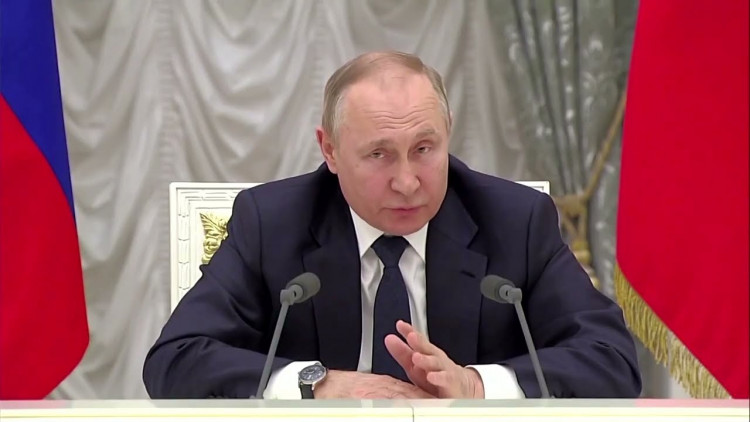Russian President Vladimir Putin escalated tensions in Ukraine on Friday, threatening to "finish off" Ukrainian forces and calling for a transitional administration to replace President Volodymyr Zelensky, as Moscow violated a U.S.-backed partial cease-fire with fresh strikes on critical infrastructure.
The Kremlin ordered a strike on an energy facility in Kherson this week, Ukrainian President Volodymyr Zelensky said, accusing Russia of breaching an agreement halting long-range attacks on energy infrastructure. The deal, backed by Washington, also aimed to reduce hostilities in the Black Sea region.
Putin made the threat during remarks at the International Arctic Forum in Murmansk. "I was saying not so long ago: 'We will finish them off.' There are reasons to believe that we will finish them off," he said. "We are gradually, not as fast as some would like, but nevertheless persistently and confidently moving toward achieving all the goals stated at the beginning of the special operation."
Russian forces launched a barrage of 163 drones overnight, Ukraine's air force reported Friday, igniting fires at agricultural and infrastructure sites in the south. Moscow's defense ministry said its troops had seized a village in the northeastern Kharkiv region and retaken a border settlement in Kursk.
The strikes came just days after talks in Saudi Arabia, where the U.S. and its allies reached a tentative understanding with Russia and Ukraine to halt attacks on energy targets. But continued drone strikes and missile attacks have led Kyiv and European leaders to accuse Moscow of prolonging negotiations without genuine intent to de-escalate.
President Donald Trump, whose administration helped broker the initial Black Sea truce, criticized Russia's actions, warning that Moscow was "dragging their feet" on negotiations after it struck the port city of Mykolaiv.
Putin also reiterated his long-standing demand for Zelensky's removal. "We could, of course, discuss with the United States, even with European countries, and of course with our partners and friends, under the auspices of the UN, the possibility of establishing a transitional administration in Ukraine," he said. "What for? To organise a democratic presidential election that would result in the coming to power of a competent government that would have the confidence of the people, and then begin negotiations with these authorities on a peace agreement and sign legitimate documents."
The Russian president has repeatedly questioned Zelensky's legitimacy, pointing to Ukraine's decision to suspend elections in 2024 under martial law. Ukrainian law permits delaying elections during wartime, and Zelensky's domestic opponents have agreed that voting should not be held until after the conflict ends.
Kremlin spokesman Dmitry Peskov defended the airstrikes, saying they were a response to what Moscow claimed were daily Ukrainian attacks on Russian energy sites. "The Russian side reserves the right, if the Kyiv regime does not observe the moratorium, also not to follow it," Peskov said.
On the ground, Russia continues pressing its advantage. Moscow claims to be expanding its control incrementally, with Putin encouraging his troops to leverage Russia's superiority in manpower and weaponry.
The Kremlin also intensified its criticism of Europe, particularly over the EU's refusal to lift sanctions on a Russian agricultural bank-a condition Moscow says is necessary to revive Black Sea grain export agreements. "If European countries don't want to go down this path, it means they don't want to go down the path of peace in unison with the efforts shown in Moscow and Washington," Peskov said.
Ukrainian officials rejected Russia's narrative. "Russia is trying to derail the path to peace by choosing to continue the war," said Andriy Yermak, chief of staff to President Zelensky.




